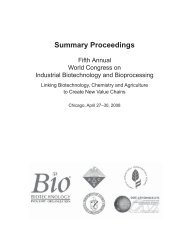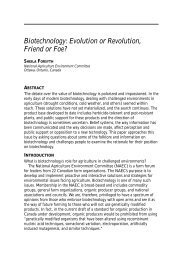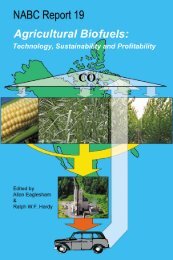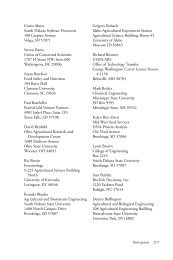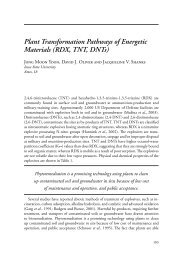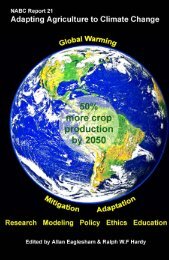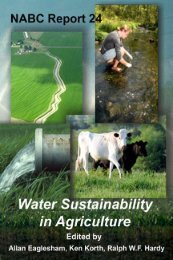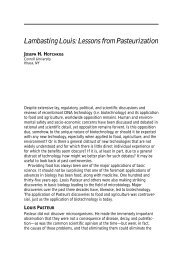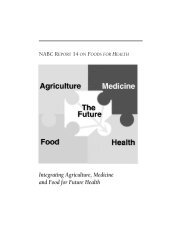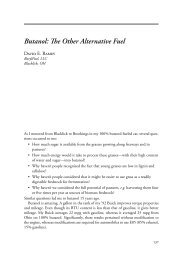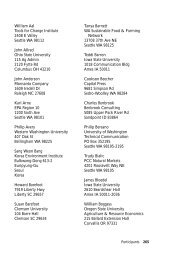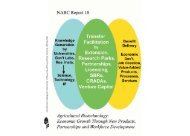Food Security - National Agricultural Biotechnology Council ...
Food Security - National Agricultural Biotechnology Council ...
Food Security - National Agricultural Biotechnology Council ...
- No tags were found...
Create successful ePaper yourself
Turn your PDF publications into a flip-book with our unique Google optimized e-Paper software.
Last November, the Forum announced two climate-change initiatives, one aimedat ending deforestation, and the other focused on phasing out the use of refrigerantgases with high global-warming potential. The Forum pledged to mobilize its collectiveresources to help achieve, by 2020, zero net deforestation, which currently accounts for17% of greenhouse-gas production. In announcing the zero net deforestation initiative,Forum leaders said:We believe that our industry has a responsibility to purchase commodities in away which encourages producers not to expand into forested areas. Our task is todevelop specific action plans for the different challenges of sourcing commoditieslike soya, palm oil, beef, paper and board sustainably.This kind of commitment is spreading. In an essay for the New York Times, the WorldWildlife Fund’s Jason Clay (2011) pointed out that major food brands are demandinggreater sustainability from their supply-chain partners through increased productivity,efficiency and the elimination of waste. In a TED Conference1 presentation, Jason Clay(2010) had kind words for work that Cargill, Coke and Mars are already doing in thisregard. He pointed out the huge opportunity that still exists, noting that a hundredcompanies control about 25% of the trade in all fifteen of the most significant agriculturalcommodities. He made a compelling case for the sustainability gains that could bewrung from the purposeful application of that market power, contending that mega-buyersof agricultural commodities can push producers toward sustainable practices fasterthan consumers can. Clay’s point is straightforward: If mega buyers decide they want tosource a commodity produced in a certain way, then producers will get in line to fulfillthat demand, as long as doing so makes economic sense. When buyers are incented byself-interest to source agricultural commodities sustainably, then producers’ self-interestsshould be well served by fulfilling that demand for sustainably produced commodities.In short, get the market forces and incentives aligned and the seeds for a self-reinforcingvirtuous cycle are planted.Developing WorldThree ground rules govern the discussion of the developing-world perspective on agriculturalproductivity, sustainability and food security. The first is to accept the premisethat long-term food security in the developing world cannot be accomplished solely viaphilanthropy or technology.I am not dismissing the important work being done by numerous foundations andNGOs in this regard, but food aid and hunger relief, as valuable as they are, cannot bethe enduring fix for the problem. An Oxfam study cited in the New York Times in May,2011, stated the case clearly (Rosenberg, 2011). It costs much less to prevent a faminethan to save lives after one has struck. Oxfam estimates that it costs seven times more toprovide emergency food relief than it does to prevent a food-security disaster. Similarly,simply providing new technologies to the developing world will not solve the food-securitychallenge.1TED Conference, “Ideas Worth Spreading”: http://www.ted.com/.64 <strong>Food</strong> <strong>Security</strong>: The Intersection of Sustainability, Safety and Defense



